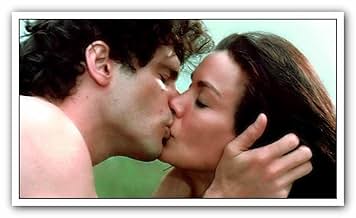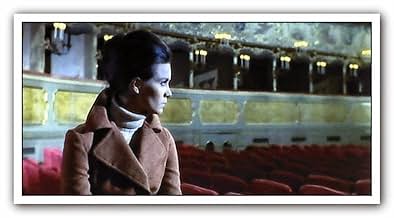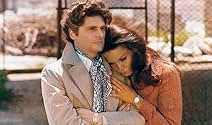Without mentioning the reason, Venetian musician Enrico invites his ex-wife Valeria to visit him, and her heart is broken again during their last days together.Without mentioning the reason, Venetian musician Enrico invites his ex-wife Valeria to visit him, and her heart is broken again during their last days together.Without mentioning the reason, Venetian musician Enrico invites his ex-wife Valeria to visit him, and her heart is broken again during their last days together.
- Awards
- 4 wins & 3 nominations total
Featured reviews
10jill-104
A beautiful film that made a great impression on me at a very early age. Although basically it is a love story, it has many other emotions which are wonderfully portrayed by Florinda Balkan and Tony Musante. Apart from the story, the theme music haunted me for months if not years. The photography of Venice is superb and will be appreciated by anyone who has ever visited there.
"Anonimo veneziano" is one of the most beautiful movies I have ever seen. Musante and Bolkan are terrific in their roles. It deserves more than one look at it.
10cerbu
beautiful movie, amazing how the ugly present( filmed in the fall -a decaying, dying Venice) contrasts with a bright, happy, past( filmed in the summer). Musante and Bolkan are great, running the whole gamut of emotions from whispers to screams, from laughter to tears, from sarcasm and blunt wickedness to compassion and love. one more thing. the music. morbidly beautiful.
don't see the English version, try to find the Italian one( both actors sound a lot more convincing in Italian-could be the accent). hopefully this can be digitally remastered, as the sound and the color really spoil the picture.
If you liked this one, try also Bobby Deerfield, somewhat similar.
don't see the English version, try to find the Italian one( both actors sound a lot more convincing in Italian-could be the accent). hopefully this can be digitally remastered, as the sound and the color really spoil the picture.
If you liked this one, try also Bobby Deerfield, somewhat similar.
in my case, not exactly a movie. only slice of my childhood. mixture of magic and delicate colors. music as shadow. Venise as large tomb - nest. it is something special with this film. with its touching beauty. with its image of letter from a lost time. with two actors who are jewelers of common strange roles. a love story, broken love story, in a place as map of soul. the escape - a musical score. words, past - Venice as huge labyrinth of memories - and the harsh circle of fall. all as pieces from an old toy of dreams dust. I do not know if it is a good film. it seems be like many others of its period. but, different. for the crumbs of sufferance as fruit of deep joy. for the search of sense who define each character. for soft victory. and, for ash of feelings - part of new kind of beginning.
What we see here is a rather strong, yet very human, representation of how love truly operates in many people's lives: It sinks its claws into one's essence, making him/her or both leery about what such love could bring and how it could evolve itself. I'm talking about fear, fear of abandonment, being cognizant of the fact that, unfortunately, many situations do not last forever.
The above comment was by me laid out mimicking Enrico's cynicism, not only because of his terminal disease, but due to his awareness of what explained above. Their love explodes, rather than blossoming, a true love I shall say, the love two persons are ready to promise to each other no matter what the odds in life may be. Unluckily for many, such drive (which was not sexual on either side in my opinion) walks its path along with an unwanted travel mate, fear, which deals its lethal blows to a lot of relationships due to past wounds and human vulnerability.
Valeria, notwithstanding her "so-called" new life, shows her devotion to Enrico throughout the entire movie, accepting his behavior, knowing what that really means, knowing that he was acting out of pain, sorrow and FEAR. After all. at one point in the movie, as he angrily throws his briefcase up in the air after disclosing his doom to Valeria, Enrico does say "All of this is happening and I should not be scared?".
Through Salerno's camera, Tony Musante portrays, via his character, the filth and mud he says Venice is made of, a city that sank in the water a very long time before; he admits, by way of his actions and words, to have become part of that squalid scene.
Being human though also implies hope, current or lost that it may be, which we notice only once when he says "There's still a lot of poetry in life" before taking Valeria to purchase a brocade tailor made dress. I won't comment on his citation of Proust Unlike (always in my opinion)Morricone, Stelvio Cipriani creates more of a one-to-one musical situation in the movies accompanied by its scores (e.g., L'ultima neve di primavera, Dov'è Anna et al), where the sounds, always rather somber, act as a narrator while the characters perform.
Musante and Bolkan were a perfect match, as their figures portray "Man and Woman", with every related quirk and problem, underpinned, however, by a love that will never end. Valeria realizes he really always loved her once it becomes obvious to her that he really needed to see her before dying, also when he prompts her to go before missing her last train to Ferrara. Sadly for her, the train she really missed had left Venice 7 years before from a track that only brought it back to her for a few hours that day only, to see it depart again, this time, toward a point of no return.
Valeria will carry on painfully, as she truly always loved Enrico.
The above comment was by me laid out mimicking Enrico's cynicism, not only because of his terminal disease, but due to his awareness of what explained above. Their love explodes, rather than blossoming, a true love I shall say, the love two persons are ready to promise to each other no matter what the odds in life may be. Unluckily for many, such drive (which was not sexual on either side in my opinion) walks its path along with an unwanted travel mate, fear, which deals its lethal blows to a lot of relationships due to past wounds and human vulnerability.
Valeria, notwithstanding her "so-called" new life, shows her devotion to Enrico throughout the entire movie, accepting his behavior, knowing what that really means, knowing that he was acting out of pain, sorrow and FEAR. After all. at one point in the movie, as he angrily throws his briefcase up in the air after disclosing his doom to Valeria, Enrico does say "All of this is happening and I should not be scared?".
Through Salerno's camera, Tony Musante portrays, via his character, the filth and mud he says Venice is made of, a city that sank in the water a very long time before; he admits, by way of his actions and words, to have become part of that squalid scene.
Being human though also implies hope, current or lost that it may be, which we notice only once when he says "There's still a lot of poetry in life" before taking Valeria to purchase a brocade tailor made dress. I won't comment on his citation of Proust Unlike (always in my opinion)Morricone, Stelvio Cipriani creates more of a one-to-one musical situation in the movies accompanied by its scores (e.g., L'ultima neve di primavera, Dov'è Anna et al), where the sounds, always rather somber, act as a narrator while the characters perform.
Musante and Bolkan were a perfect match, as their figures portray "Man and Woman", with every related quirk and problem, underpinned, however, by a love that will never end. Valeria realizes he really always loved her once it becomes obvious to her that he really needed to see her before dying, also when he prompts her to go before missing her last train to Ferrara. Sadly for her, the train she really missed had left Venice 7 years before from a track that only brought it back to her for a few hours that day only, to see it depart again, this time, toward a point of no return.
Valeria will carry on painfully, as she truly always loved Enrico.
Did you know
- TriviaBoth Tony Musante and Florinda Bolkan had all their dialogue re-dubbed, since neither was a native Italian speaker; Musante was American and Bolkan is Brazilian.
- GoofsWithin the first 5 minutes of the movie, the clocks at the station show different hours: 7:50 while Enrico is smelling the flowers, 9:25 when the train arrives and 6:40 when Valeria and Enrico leave the station.
- Alternate versionsIn Spain the movie has more than 3 minutes excised off. This version is still the one shown on TV and Home Video. It has one full scene missing (the one with Musante playing a game with a bunch of school boys), brief cuts concerning glimpses of nudity and an abrupt cut when the couple walk through the train station at the very beginning.
- ConnectionsReferenced in Brasil em Cannes (1971)
- SoundtracksLa 5ª Sinfonia di Beethoven
Composed by Ludwig van Beethoven (as Beethoven)
Conducted by Giorgio Gaslini
- How long is The Anonymous Venetian?Powered by Alexa
Details
- Release date
- Country of origin
- Language
- Also known as
- Des Lebens Herrlichkeit
- Filming locations
- Production company
- See more company credits at IMDbPro
- Runtime
- 1h 31m(91 min)
- Sound mix
Contribute to this page
Suggest an edit or add missing content
























